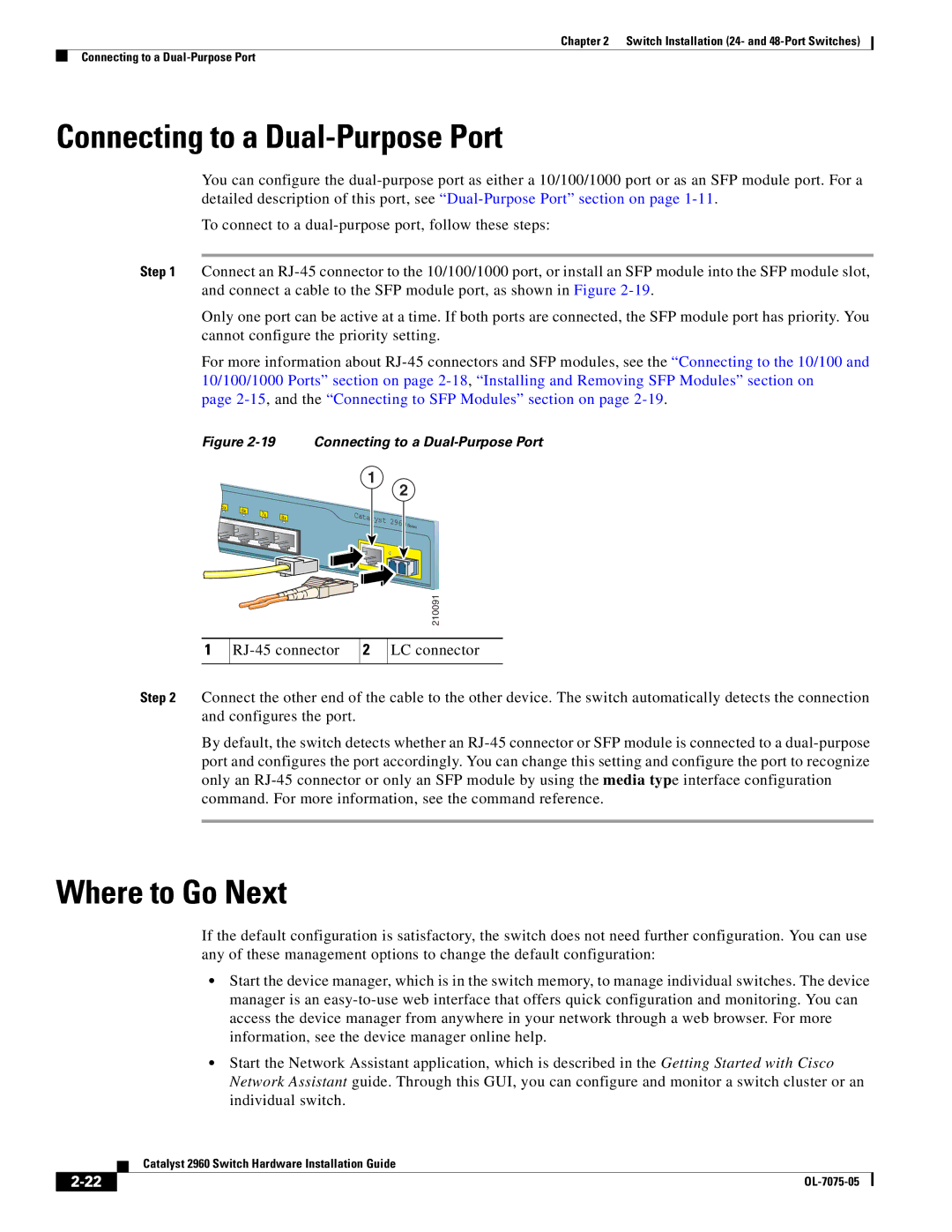Catalyst 2960 Switch Hardware Installation Guide
Catalyst 2960 Switch Hardware Installation Guide
N T E N T S
Rack-Mounting2-8 Removing Screws from the Switch
Console Port A-4
Starting the Terminal Emulation Software
Audience
Purpose
Conventions
Related Documentation
For information about related products, see these documents
Preface
Preface Catalyst 2960 Switch Hardware Installation Guide
Features
Product Overview
1000BASE-CWDM
Catalyst 2960 Switch 24- and 48-Port Switches
These sections describe the switch front panels
Front Panel Description
Catalyst 2960-24-S, 2960-24TC-S, and 2960-48TC-S Switches
10/100 ports Dual-purpose ports
10/100 ports 2 Dual-purpose ports
Catalyst 2960-24TC-L Switch Front Panel
Catalyst 2960G-24TC-L and Catalyst 2960G-48TC-L Switches
10/100 ports
10/100 ports 2 10/100/1000 uplink ports
These sections describe the Catalyst 2960 8-port switches
Catalyst 2960 Switch 8-Port Switches
Catalyst 2960PD-8TT-L Switch
10/100/1000 ports 2 Dual-purpose ports
Catalyst 2960-8TC-L Catalyst 2960G-8TC -L Switches
10/100 Ports
Console port Dual-purpose port 10/100/1000 ports
10/100/1000 Ports
PoE Ports
SFP Module Slots
Power Input Port Catalyst 2960PD-8TT-L Switch
Dual-Purpose Port
10/100/1000 Port
16 Connecting Through an External AC Power Adapter
LEDs
Speed LED
Mode button
System LED
Status LED Port LEDs Duplex LED
Port status Port status. This is the default mode
Port LEDs and Modes
Port speed Port operating speed 10, 100, or 1000 Mb/s
Port Mode LED Color Meaning
Meaning of Port LED Colors in Different Modes on the Switch
Rear Panel Description
Dual-Purpose Port LEDs
Power Supplies
Internal Power Supply Connector
Cisco RPS Connectors
Cisco RPS 2300 Connector
Console Port
Management Options
Security Slots
Security slot
Network Configurations
OL-7075-05
Switch Installation 24- and 48-Port Switches
Preparing for Installation
This section covers these topics
PWR-RPS2300, PWR675-AC-RPS-N1=. Statement
Statement 371-Power Cable and AC Adapter
Guidelines for Particulate Matter
Installation Guidelines
Verifying Package Contents
Installing the Switch
Verifying Switch Operation
Removing Screws from the Switch
Rack-Mounting
Attaching Brackets to the Catalyst 2960 Switch
Phillips flat-head screws
137076
Mounting the Switch in a Rack
Phillips machine screws
Wall-Mounting
Attaching the Cable Guide
Cable guide screw
Phillips pan-head screws RPS connector RPS connector cover
Attaching the Brackets to the Switch for Wall-Mounting
Attaching the RPS Connector Cover
Phillips truss-head screws
Mounting the Switch on a Wall
User-supplied screws
Installing and Removing SFP Modules
Table- or Shelf-Mounting
Installing SFP Modules into SFP Module Slots
13 SFP Module with a Bale-Clasp Latch
Removing SFP Modules from SFP Module Slots
SFP module
Connecting to the 10/100 and 10/100/1000 Ports
Connecting to SFP Modules
16 Connecting to an Ethernet Port
Connecting to Fiber-Optic SFP Modules
17 Connecting to a Fiber-Optic SFP Module Port
Connecting to 1000BASE-T SFP Modules
18 Connecting to a 1000BASE-T SFP Module
Connecting to a Dual-Purpose Port
Where to Go Next
Start an Snmp application such as the CiscoView application
OL-7075-05
Switch Installation 8-Port Switches
Statement 371-Power Cable and AC Adapter
Installation Guidelines
Equipment That You Supply
Verifying Package Contents
Verifying Switch Operation
Desk- or Shelf-Mounting without Mounting Screws
Desk- or Shelf-Mounting with Mounting Screws
Installing the Mounting Screws on Top of a Desk or Shelf
Mounting the Switch on Top of a Desk or Shelf
Under the Desk- or Shelf-Mounting with Mounting Screws
Installing the Mounting Screws Under a Desk or Shelf
Desk or shelf Screws Screw template Adhesive
Mounting the Switch Under a Desk or Shelf
Desk or shelf Slides on this way Screws
Wall-Mounting with Mounting Screws
Wall Screw template Screws
Switch 3 Slides on this way Screw
Installing the Switch On a Wall
Magnet Mounting
Magnet
Attaching Brackets to the Switch
Phillips flat-head screw
Mounting the Switch in a 19-Inch Rack
Wall-Mounting with Rack-Mount Brackets
10 Mounting the Switch on a Wall
Switch Installation 8-Port Switches Where to Go Next
Diagnosing Problems
This section includes these troubleshooting topics
Verify Switch Connections
Verify Switch Post Results
Monitor Switch LEDs
Bad or Damaged Cable
Ethernet and Fiber Cables
Transceiver Module Port Issues
Port and Interface Settings
Link Status
Spanning Tree Loops
Monitor Switch Performance
Ping the End Device
Speed, Duplex, and Autonegotiation
Clearing the Switch IP Address and Configuration
Autonegotiation and NIC Cards
Cabling Distance
Locating the Switch Serial Number
Cisco 11-character label
200186
OL-7075-05
Connector Specifications
Connecting to 10BASE-T- and 100BASE-TX-Compatible Devices
Connecting to 1000BASE-T Devices
3 4 5 6 7
SFP Module Ports
Dual-Purpose Ports
Cable and Adapter Specifications
SFP Module Cable Specifications
1310
1310 TX
652 32,810 feet 10 km GLC-FE-100BX-D 1550 RX GLC-FE-100BX-U
50/125 500 Feet 2 km GLC-GE-100FX 62.5/125
Two Twisted-Pair Cable Pinouts
Four Twisted-Pair Cable Pinouts for 1000BASE-T Ports
Crossover Cable and Adapter Pinouts
Identifying a Crossover Cable
Adapter Pinouts
TxD RxD
RxD TxD
Technical Specifications
Power Requirements
Physical Dimensions
Power Requirements
Accessing the CLI
Accessing the CLI Through Express Setup
Connecting to the Console Port
Accessing the CLI Through the Console Port
Figure C-1 Connecting a Switch to a PC
Starting the Terminal Emulation Software
Connecting to a Power Source
Entering the Initial Configuration Information
IP Settings
Completing the Setup Program
These choices appear
Catalyst 2960 Switch Hardware Installation Guide OL-7075-05
OL-7075-05
AC power adapter for Catalyst 2960PD-8TT-L switch
AC power Connecting to
Connector Specifications
Cable guide, attaching Cable lengths
Connection procedures
Accessing by using Express Setup C-1
Connecting to the console port
Connectors and cables 10/100/1000 A-1 to A-2 Console
No user-serviceable parts warning
PoE Port mode
System Troubleshooting with Lightning activity warning
LEDs Color meanings
Port and interface troubleshooting Rack-mounting warning
High-powered devices
On Catalyst 2960-24PC-L and 24LT-L switches
See also Mode button Description
Connectors Described Installation
Attachment warning 1-19,2-2,2-7connecting to 2-7,3-6
Safety warnings
Shelf-mounting
Read the wall-mounting instructions
Trained and qualified personnel

